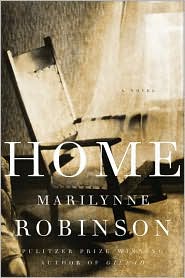 A book with a name like this could technically go wrong, I guess, but I would have been surprised.
A book with a name like this could technically go wrong, I guess, but I would have been surprised.Marilynne Robinson captures not only the home/homeless tension, but also treats well the relationship between men and women (in a way, this book is a culmination of her female-perspective laden Housekeeping and her male-perspective laden Gilead). In Home, the complementarity of the relationship between men and women is present, and not in a romantic relationship, which is usually the case, and not in a friendship, which it is difficult to keep uncomplicated (although possible!), but in a brother/sister relationship (Robinson is clever in choosing this relationship).
Robinson does not shun typical ways of relating: the main character, Glory, serves her brother and father by cooking and hostessing. She also often plays a quiet role in smoothing things over. She has strong maternal impulses. Also, her father names his daughters after abstract qualities of God, but names his sons after friends. Here we gain an important insight into Glory's father and see a dramatic difference from Glory's actually concrete, connected character.
Jack, another main character, is portrayed as deeply flawed and is, still, a deeply sympathetic character. This is one of my favorite character types--the ones who see their own failings so clearly that they barely have hope. It is in this very sincere grief over their own shortcomings that is apparent that there is much hope for them. Jack sees himself as almost tragically flawed; it is clear to the reader, however, that there is much that is redemptive in his honesty and his sincere search for relationship.

No comments:
Post a Comment